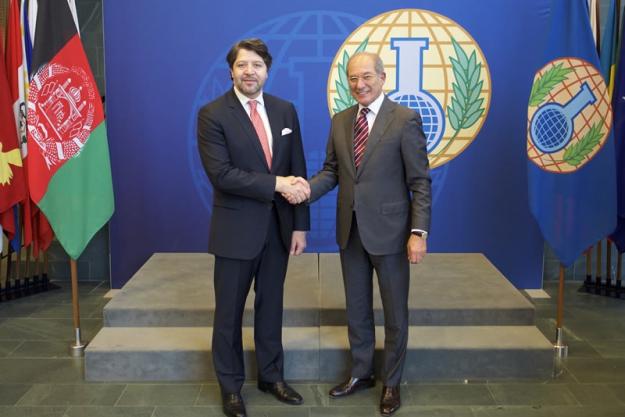
OPCW Director-General Ahmet Üzümcü (right) and the Deputy Minister of Foreign Affairs of Afghanistan H.E. Mr Hekmat Khalil Karzai.
The Director-General of the Organisation for the Prohibition of Chemical Weapons (OPCW), Ambassador Ahmet Üzümcü, and the Deputy Minister of Foreign Affairs of the Islamic Republic of Afghanistan, H.E. Mr Hekmat Khalil Karzai, discussed common efforts in advancing the goals of the Chemical Weapons Convention during yesterday’s meeting at OPCW Headquarters in The Hague.
The Director-General and the Deputy Foreign Minister exchanged ideas about a broad spectrum of issues pertinent to the OPCW agenda, including efforts to counter the use of chemical weapons by non-state actors. They also spoke about ongoing and future activities of the Organisation in the fields of international cooperation, assistance and protection, and national implementation.
Ambassador Üzümcü underlined that the OPCW attaches special importance to expanding its training and assistance programmes to help build capacity among States Parties, especially where the needs are greatest. “Afghanistan is an important State Party and our discussions today have reaffirmed that the OPCW can rely on Afghanistan’s cooperation in advancing our common goal of chemical disarmament,” stressed the Director-General.
“Afghanistan is committed to the full implementation of the CWC and in this regard is ready to work closely with the OPCW,” stated the Deputy Foreign Minister.
Background
Afghanistan joined the Chemical Weapons Convention in 2003. The country actively engages in and benefits from OPCW’s international cooperation programmes.
The Chemical Weapons Convention comprehensively prohibits the use, development, production, stockpiling and transfer of chemical weapons. Any chemical used for warfare is considered a chemical weapon by the Convention.
As the implementing body for the Chemical Weapons Convention, the OPCW oversees the global endeavour to permanently eliminate chemical weapons. Since the Convention’s entry into force in 1997 – with its 192 States Parties – it is the most successful disarmament treaty eliminating an entire class of weapons of mass destruction.
To date, nearly 93 per cent of all chemical weapon stockpiles declared by possessor States have been destroyed under OPCW verification. For its extensive efforts in eliminating chemical weapons, the OPCW received the 2013 Nobel Prize for Peace.
